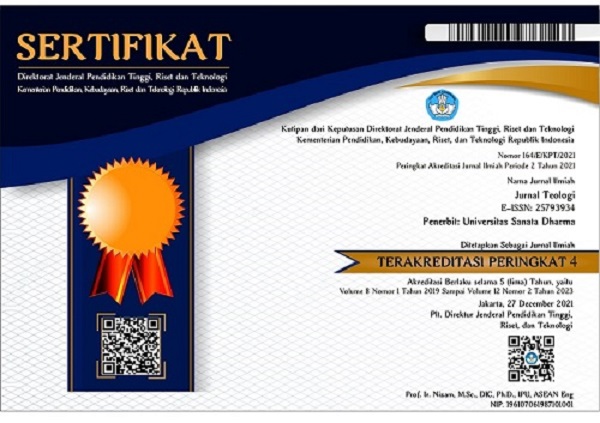GERAKAN SOSIAL BERBASIS MEDIA SOSIAL DALAM PERSPEKTIF MORAL SOSIAL
(1) Universitas Sanata Dharma
(*) Corresponding Author
Abstract
Abstract
Social media as the prominent phenomenon of digital culture has become the infrastructure for social and political movements. Digital media platforms such as Facebook and Twitter have become practical tools for social movements, especially for communicating, organizing, and gaining wider publicity. However, a more careful study shows that activism on social media can only become an impactful socio-political movement if it meets the requirements of contemporary culture. Social media apparently does not support the absorption and deepening of complex discourses or difficult issues. In addition, direct (offline) activities, namely traditional forms of organization, are absolutely necessary for resilient and impactful social movements. These findings are in line with the study of social movements in the Catholic Church. Only through direct action in the offline realm can social movements foster spirituality, empower people, manifest a sense of solidarity, and become deep collective movements that inspire continuous effort for the sake of the common good.
Abstraksi
Media sosial, yang menjadi fenomena utama dari kultur digital saat ini, telah menjadi infrastruktur bagi gerakan-gerakan sosial dan politik. Platform media digital seperti Facebook dan Twitter telah menjadi perangkat gerakan-gerakan sosial yang efektif, terutama untuk berkomunikasi, mengorganisasikan gerakan, dan memperoleh publisitas yang lebih luas. Namun demikian, kajian yang lebih teliti menunjukkan bahwa aktivisme di media sosial hanya dapat menjadi gerakan sosial-politik yang berdampak jika memenuhi syarat-syarat budaya kontemporer. Media sosial ternyata tidak mendukung pencerapan dan pendalaman terhadap wacana yang kompleks atau isu-isu sulit. Selain itu, aktivitas langsung (luring), yakni bentuk-bentuk pengorganisasian tradisional, merupakan hal yang mutlak perlu demi gerakan sosial yang berdaya tahan dan berdampak. Temuan ini ternyata selaras dengan kajian terhadap gerakan-gerakan sosial dalam Gereja Katolik. Hanya melalui aksi langsung di ranah luring, gerakan sosial menjadi gerak bersama yang mendalam, menumbuhkan spiritualitas, memberdayakan partisipannya, mewujudnyatakan rasa solidaritas, serta menjadi usaha berkelanjutan demi terciptanya kebaikan bersama.
Keywords
Full Text:
PDF (Bahasa Indonesia)References
Balleis, Peter. “Global Human Mobility, Refugees, and Jesuit Education at the Margins”. Dalam Thomas Banchoff dan Jose Casanova (eds.), Jesuit and Globalization: Historical Legacies and Contemporary Challenges. Washington, DC: Georgetown University, 2016, 224-238.
Clement, J. “Worldwide digital population as of July 2019” (Sep 17, 2019). Diakses dari https://www.statista.com/statistics/617136/digital-population-worldwide/.
Clement, J. “Most famous social network sites 2019, by active users” (Sep 6, 2019). Diakses dari https://www.statista.com/statistics/272014/global-social-networks-ranked-by-number-of-users/.
Cohen, Roger. “Facebook and Arab Dignity” (24 January 2011). Diakses dari https://www.nytimes.com/2011/01/25/opinion/25iht-edcohen25.html
“Do today’s global protests have anything in common?”. Diakese dari https://www.bbc.com/news/world-50123743. Finn, Daniel K. (ed.). Empirical Foundations of the Common Good: What Can Theology Learn from Social Science. New York: Oxford University Press, 2017.
Harari, Yuval Noah. 21 Adab untuk Abad ke-21 (terjemahan dari 21 Lessons for the 21st Century, penerj. Haz Algebra). Manado: Globalindo, 2018.
Hollenbach, David. The Common Good and Christian Ethics. Cambridge: Cambridge University Press, 2002.
Hollenbach, David. “The Jesuits and the ‘More Universal Good’: Jesuit at Vatican II and Today”. Dalam Thomas Banchoff dan Jose Casanova (eds.), The Jesuit and Globalization: Historical Legacies and Contemporary Challenges. Washington, DC: Georgetown University, 2016, 169-187.
Hollenbach, David. “Sustaining Catholic Social Engagement: A Key Role for Movements in the Church Today”. Journal of Catholic Social Thought, Vol. 10, Issue 2 (Summer 2013): 431-447.
Johnson, Chandra. “How algorithms affect our way of life”. Diakses dari https://www.deseret.com/2017/3/10/20607853/how-algorithms-affect-our-way-of-life#chances-are-youve-heard-of-algorithms-over-the-years-but-experts-say-everyone-needs-to-become-aware-of-what-they-are-and-how-they-stand-to-change-life-on-earth-in-the-future
Kidd, Dustin dan Keith McIntosh. “Social Media and Social Movements”. Sociology Compass 10/9 (2016): 785-794.
Lim, Merlyna. “Klik yang Tak Memantik: Aktivisme Media Sosial di Indonesia”. Jurnal Komunikasi Indonesia, Vol. III, No. 1, April (2014): 35-49.
Lim, Merlyna. “Many Clicks but Little Sticks: Social Media Activism in Indonesia”. Journal of Contemporary Asia, Volume 43, No. 4 (2013): 636-657.
Lim, Merlyna. “Roots, Routes, and Routers: Communications and Media: Contemporary Social Movements”. Journalism & Communication Monographs, Vol. 20, No. 2 (Summer 2018): 92–136
Marcia Mundt, Karen Ross dan Charla M. Burnett. “Scaling Social Movements Through Social Media: The Case of Black Lives Matter”. Social Media + Society (October-December 2018): 1-14.
Nations, Daniel. “What Is Social Media? Take a closer look at what social media is really all about”. Diakses dari https://www.lifewire.com/what-is-social-media-explaining-the-big-trend-3486616.
Rachman, Gideon, dkk. “Leaderless rebellion: how social media enables global protests”. Diakses dari https://www.ft.com/content/19dc5dfe-f67b-11e9-a79c-bc9acae3b654.
Rawls, John. Political Liberalism. New York: Columbia University Press, 1993.
Setyo Wibowo, A. “Media Sosial dan Mobokrasi”. Majalah Basis, No. 11-12, Tahun ke-66 (2017): 2-3.
Tufekci, Zeynep. “Social Movements and Governments in the Digital Age: Evaluating a Complex Landscape”. Journal of International Affairs, Vol. 68, N0. 1 (Fall/Winter 2014): 1-18.
United States Conference of Catholic Bishops. “Social Media Guidelines”. Diakses dari http://www.usccb.org/about/communications/social-media-guidelines.cfm
Venturini, Federico. “Social movements’ powerlessness at the time of covid-19: a personal account”, Interface: A journal for and about social movements, Volume 12 (1) (July 2020): 43-46.
Wearesosial (2019). Diakses dari https://websindo.com/indonesia-digital-2019-media-sosial/ dan https://databoks.katadata.co.id/datapublish/2019/02/08/berapa-pengguna-media-sosial-indonesia.
DOI: https://doi.org/10.24071/jt.v11i01.4397
Refbacks
- There are currently no refbacks.

This work is licensed under a Creative Commons Attribution-ShareAlike 4.0 International License.
.jpg)
Indexed and abstracted in:
P-ISSN: 2302 - 5476 (Validity starting Volume 2012-10-05)
E-ISSN: 2579 - 3934 (Validity starting Volume 6, No. 1, Mei 2017)
Jurnal Teologi (Journal of Theology) by Faculty of Theology Sanata Dharma University

This work is licensed under a Creative Commons Attribution-ShareAlike 4.0 International License.














